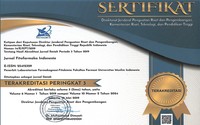DAYA TOLAK INFUSA DAUN PANDAN WANGI (Pandanus amaryllifolius Roxb.) TERHADAP PELETAKAN TELUR NYAMUK Aedes spp
Abstract
Aedes spp larval resistance against chemical insecticide has been reported in many country. The new methods that can be used to control the mosquito populations as a dengue fever vector and alternative compound which is safe for environtment and can’t cause the resistance need to be found. Pandan leaves have aromatic fragrant that can be expected as a oviposition deterrent effect against Aeses spp mosquito. To know oviposition deterrent effects and optimum consentration of pandan leaves (Pandanus amaryllifolius Roxb.) infusa against Aedes spp. This research was an experimental research using six groups of concentration. There was 0 mL/L (control), 3 mL/L, 3,5 mL/L, 4 mL/L, 4,5 mL/L and 5 mL/L. Every groups would be repeated by fourth. Ovitraps with different concentration of pandan leaves infusa placed at research location. The mosquito eggs that caught at the ovitrap would be counting and identifying in the laboratorium. Data was analyzed using One Way Anova test via computer program SPSS 19.0 and then continued by LSD test with 95% confidence level. The repellency percentage at 3 mL/L concentration is 30.35%; 3,5 mL/L is 55.35%; 4 mL/L is 65.17%; 4,5 mL/L is 82.14% and 5 mL/L is 100% with significancy value is 0,000 (p<0,05).
Full Text:
PDF (Bahasa Indonesia)DOI: https://doi.org/10.33096/jffi.v1i2.192
Copyright (c) 2016 Jurnal Fitofarmaka Indonesia
Indexed by:
ISSN: 2356-0398 | e-ISSN: 2541-2329
Editor's Address:
Third Floor Pharmacognosy-phytochemistry laboratory building, Urip Sumoharjo road km. 5 Campus II UMI, Makassar, South Sulawesi, Indonesia
Phone: +6281524045514
Fax: +62411425619
E-mail: editorjfi@umi.ac.id

















.jpg)

